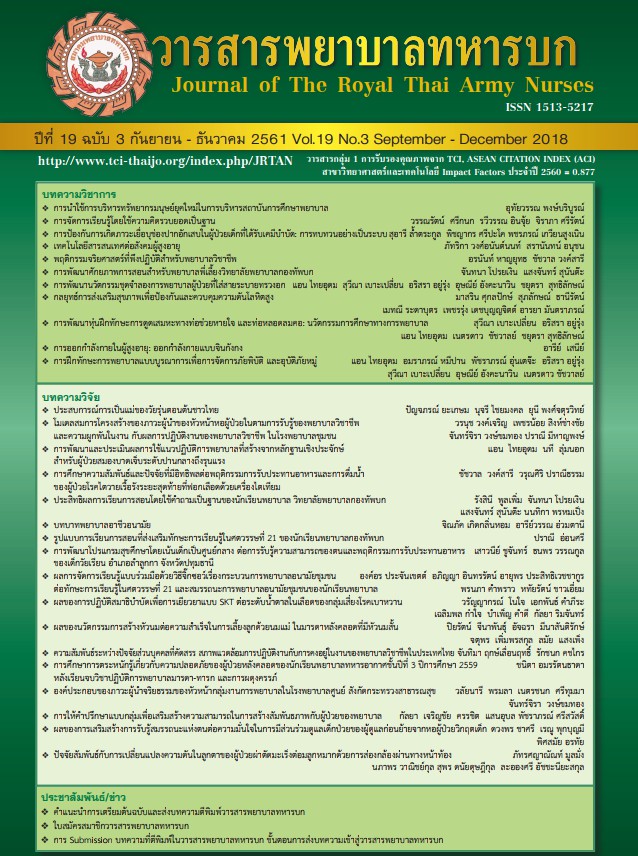An Instructional Model for Enhancing 21st-Century Learning Skills among Army Nursing Students
Keywords:
Instructional model, 21st-century learning skills, Army nursing studentsAbstract
This classroom action research was aimed to study the effectiveness of an instructional model for enhancing 21st-century learning skills among Army nursing students. The participants were 82 third-year army nursing students who took Nursing Research Course using a purposive sampling method. One Group Pre-test Post-test design was applied. The Instructional model consisted of 6 sequential steps as follows: 1. Assignment 2. Classroom questioning 3. Transfer of learning 4. Idea sharing 5. Verbal presentation and 6. Effective reflection. The participants were invited to complete the Questionnaires. Each item was measured on a 1-5 Likert-scale. The validity of the questionnaire was conducted by 3 experts, and the Cronbach’s alpha coefficient was 0.86.Data analysis was done by means, standard deviations and the dependent t-test. It was found that an overall of the subjects’ scores of 21st-century learning skill for both pre-test and post-test were in a good level ( = 3.98 and 4.07 respectively). There was no significantly statistical difference in 21st -century learning skills between before and after the intervention. The average score of overall satisfaction towards the instructional model was in a moderate level. ( = 2.91). When considering each item separately, the item “opportunity to ask questions and share their opinion ”had the highest mean score which was in a moderate level ( = 3.27). Whereas, the item “learning activity enhance understanding” had the lowest mean score. ( = 2.56). It was shown that Instructional model should be applied for learning provision. The findings would not only help nursing educators but also provide practical recommendations for teaching improvement. For example, assignments and classroom questionings should be done at the end of the class. The others four steps: transfer of learning, idea sharing, verbal presentation and effective reflection must be based on learners’understanding.
Downloads
References
2. Khammanee T. Sciences teaching: knowledge for the learning process to be effective. (18 th ed.). Bangkok: Chulalongkorn University. 2014. (In Thai)
3. Panich V. 21st Century Learning Framework. Bangkok: Sodsri-Saritwong Foundation. (In Thai)
4. Sattrapruek S. and Bunchusuwan P. Good Governance for Community Enterprise Management and Development. Journal of Community Development and Life Quality. 2015. 3(3): 271-283. (In Thai)
5. Ministry of Education. Essential 21st Century Learning Skill. 2016. (In Thai)
6. Jamnonjit S. and et al. The 21st Century Learning Skills as Perceived by Nursing Students at The Royal Thai Army Nursing College. Thesis
(Bachelor of Nursing Science). The Royal Thai Army Nursing College. 2015. (In Thai)
7. Onsri P. The Development of An Instructional Model for Enhancing Brain-based Learning Among Nursing Students of the Royal Thai Army Nursing College. Royal Thai Army Medical Journal. 2012. 65(4): 249-257. (In Thai)
8. Kangpeng S. Interpretation Criterion of Average Score from Rating Scale Questionnaire. (In Thai)
9. Wangkid M., Onming R. and Kasemnet L. Development of Instructional Model for Information Technology Focused on Self-Directed Learning in Flipped Learning with Grade Seven Students. Phranakhon Rajabhat Research Journal (HumanitIes and Social Science). 2017. 12 (1): 190-204. (In Thai)
10. Ariya K., Kaewurai W. and Chaisanit P. A Development of an Instructional Model Based-on Differentiated Instruction Approach to Enhance the Ability of Learning Management Design of 21st Century for Student and Teachers, Rajabhat University. Lampang Rajabhat University Journal. 2016. 5(2): 1-17. (In Thai)
11. Clark, K. R. 2013. Examining the effects of the flipped model of instruction on student engagement and performance in the secondary mathematics classroom: An action research study. Ph.D. Dissertation, Capella University.
12. Gagnon GW. and Collay M. 2006. Designing for Learning : Six Elements in Constructivist Classrooms. California : Corwin Press, Inc.
13. Office of the Non-Formal and Informal Education. Policy and Action Plan 2013. Bangkok: The Agricultural Co-operative Federation of Thailand. 2013. (In Thai)
14. Trilling R, Fadel C. 2009. 21st Century Skills: Learning for Life in Our Times. San Francisco: Jossey-Bass.
15. Prensky, M. 2001. Digital natives, digital immigrants. In the Horizon Journal, 9(5): 14-25.
16. Saadnuk A. Skill from Learning Management in 21st Century, Faculty of Management Science, Silpakorn University Case study technology
and innovation utilization subject. 1st National Conference “Education Research” 29-30 May 2014. (In Thai)
17. Tumnanchit B. Attitude among Information Technology Students toward Communication Skill for Technology Business Subject. Thesis Master of Education. Suan Dusit Rajabhat University. 2009. (In Thai)
18. Paopanao S. The study of information technology and communication competencies for learning of Undergraduate students in Rajamangala
University of Technology Rattanakosin Wangkraikangwon Campus. Veridian E-Journal, SU. 2012. 5 (1): 541-561. (In Thai)
19. Thumthong B. Theories and Learning Development. 2nd ed. Bangkok: S Printing Thai Factory. 2013. (In Thai)
20. Imsuwan C. Concept and Non-Formal and Informal Education Theories. Bangkok: Chulalongkorn University. 2008. (In Thai)
21. Sweller J. The worked example effect and human cognition: Learning and Instruction. New Jersey: Educational Technologies. 2006.
22. Sompuet P. Organized Active Learning by Instructional Model with Case-Based. Phranakhon Rajabhat Research Journal (Humanities and Social Sciences). 2016. 11(2) : 260-270. (In Thai)
23. Ngamprapasom P. To Increase the Potential and Learning Achievement by Using Group Learning Process. Lampang Rajabhat University Journal. 2012; 1(1): 58-66.
24. Luxviramsiri A. Human Relationship and Responsibility Development by Project-Based Learning in Electronic Business Management Subject. Classroom Action Research Report. 2016.
Downloads
Published
How to Cite
Issue
Section
License
บทความหรือข้อคิดเห็นใดใดที่ปรากฏในวารสารพยาบาลทหารบกเป็นวรรณกรรมของผู้เขียน ซึ่งบรรณาธิการหรือสมาคมพยาบาลทหารบก ไม่จำเป็นต้องเห็นด้วย
บทความที่ได้รับการตีพิมพ์เป็นลิขสิทธิ์ของวารสารพยาบาลทหารบก
The ideas and opinions expressed in the Journal of The Royal Thai Army Nurses are those of the authors and not necessarily those
of the editor or Royal Thai Army Nurses Association.






